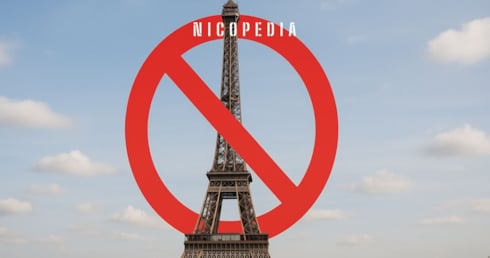Planning a Trip to France? Beware the New Pouch Ban

Key Takeaways
- France has banned nicotine pouches, criminalising sale and possession.
- Penalties could include prison time and fines of up to €15,000.
- Chewing tobacco is exempt, despite being linked to cancer.
- Critics warn that the ban undermines harm reduction goals.
- Haypp urges a champagne boycott to protest the disproportionate ban.
France’s New Ban on Nicotine Pouches
The French government has recently announced a total ban on nicotine pouches. The ban was announced on September 5th and will come into force in March 2026.
The strict new law bans a whole range of oral nicotine products, including pouches, gums, and liquids. Only products classified as medicinal products or medical devices are exempt.
The French ban was opposed by a number of EU countries, including Sweden, Italy, and Greece, who see the prohibition as disproportionate and damaging for anti-smoking strategies.
Severe Penalties—Even for Tourists
The ban criminalises both the sale and possession of nicotine products. This means that simply having nicotine pouches for personal use could result in severe penalties.
Importantly for UK nicotine pouch users, the law will apply to anyone in France, so a holidaymaker caught with nicotine pouches in France could face prosecution and thousands of euros in fines.
Haypp’s Response: Boycott Champagne
In response to the ban, Markus Lindblad, Head of Legal and External Affairs at Haypp is calling on nicotine pouch customers to boycott champagne.
“We are encouraging our customers around the globe, including in the UK, to boycott champagne, and reconsider choosing France as a holiday destination next year. We want to do all we can to send a message to the French government that this ban is ill conceived and will do more harm than good.
Of course, calling for a boycott of champagne is a little tongue in cheek, but there is a serious point here."
Lindblad continues:
"France still has an exceptionally high smoking rate, around 23% compared to about 12% in the UK. Nicotine pouches are an effective alternative to cancer causing cigarettes, so completely banning them removes the option for French smokers.
Absurdly, this ban doesn’t include chewing tobacco, which is known to be cancer causing. If the French government’s goal really is to improve public health, then given the harms we know are caused by alcohol, it would actually make much more sense for them to ban champagne rather than nicotine pouches. We want to see strong regulation of nicotine pouches, not total prohibition.”
So, if you are planning on holidaying in France next year and bringing your pouches, then beware—you could be leaving yourself open to prosecution. Maybe there’s another destination that might be friendlier to pouch users?
And if you have a reason to celebrate and can afford to splash out on a bottle of bubbly, maybe go for the Italian, Spanish or even English fizz instead of champagne.
What You Need to Know About the Ban
The new ban is sweeping in its prohibition of oral nicotine products:
• Scope: The new law prohibits the manufacturing, importation, distribution, possession, and usage of all oral products containing nicotine. Only those classified as medicinal products or medical devices will be exempted.
• Product definition: All manufactured products that contain nicotine (synthetic or natural), packaged for sale, and designed for oral use are included within the ban. This includes non-medicinal pouches, gums, lozenges, beads, pastes, strips, and liquids.
• Excluded products: Strangely, the ban does not apply to smokeless tobacco products such as chewing tobacco (tabac à chiquer), even though they are known to be carcinogenic.
What Are the Penalties?
It’s not yet clear what the penalties will be, but the potential penalties set out in the draft decree were:
For individuals possessing or using nicotine pouches:
- Up to 1 year in prison.
- A fine of up to €15,000.
For retailers, manufacturers, importers, etc:
- Steeper penalties: up to 5 years in prison.
- Fines up to €375,000.
What Could the Impact of the Law Be?
• Criminalises a nicotine format that former smokers use to stay off cigarettes. Banning sale and possession pushes former and current smokers toward relapse or the black market rather than to regulated products.
• Disproportionate response compared to other products. France already regulates cigarettes and vapes. Singling out pouches—without showing that they pose a higher health risk than other legal nicotine products—looks like moral panic when better outcomes could be achieved by passing risk-based policies.
• EU market friction. Several EU countries objected to the new law, including Sweden and Italy, warning of barriers to the free movement of goods. France’s response did not resolve those concerns.
• France’s smoke-free goals in jeopardy. Smoking rates in France barely moved between 2020 and 2023 (-1 percentage point). Blocking effective off ramps from smoking is counterproductive.
Final Thoughts
Age limits, product standards, packaging rules, and responsible marketing can protect youth while preserving regulated adult access to less harmful alternatives. At Haypp, we believe that regulation beats prohibition.
